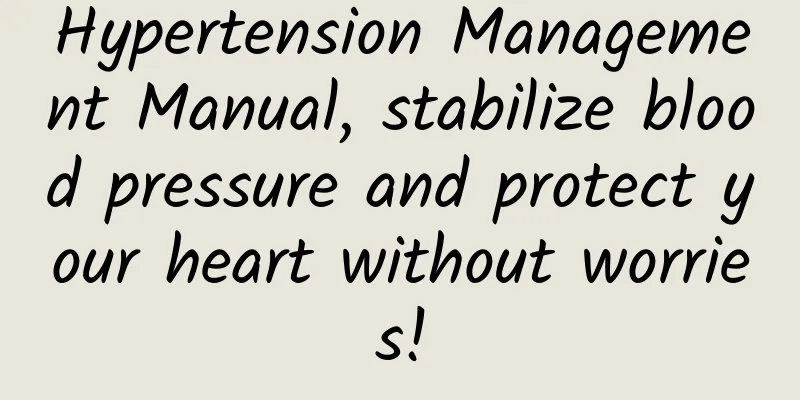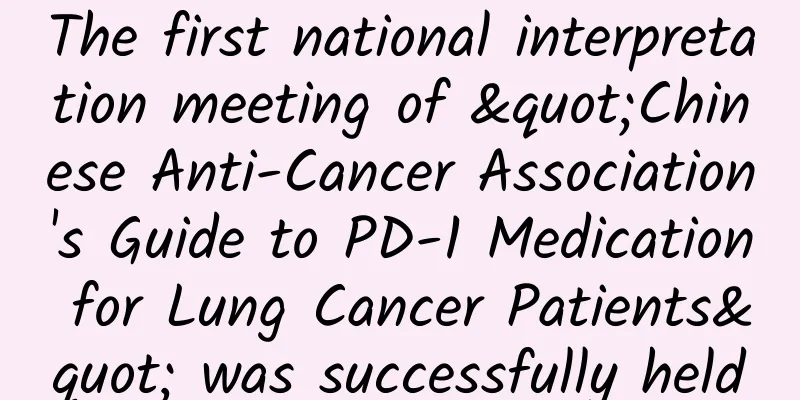Hypertension Management Manual, stabilize blood pressure and protect your heart without worries!

|
Hypertension, a health term that frequently appears in modern society, silently affects the lives of many people. According to statistics, there are more than 270 million hypertensive patients in my country, and this number continues to grow. Hypertension is not only a disease in itself, but also an important risk factor for cardiovascular and cerebrovascular diseases, such as stroke, myocardial infarction, heart failure and chronic kidney disease, which are closely related to hypertension. Therefore, effective management of hypertension is crucial to maintaining personal health and improving the quality of life. We will provide a comprehensive and practical management manual for hypertensive patients to help you stabilize blood pressure, protect your heart and stay away from complications. 1. Understanding Hypertension Hypertension is medically defined as systolic blood pressure ≥140mmHg and/or diastolic blood pressure ≥90mmHg without the use of antihypertensive drugs. Systolic blood pressure refers to the pressure of blood on the blood vessel wall when the heart contracts, and diastolic blood pressure refers to the pressure of blood on the blood vessel wall when the heart relaxes. Hypertension is divided into primary hypertension and secondary hypertension, of which primary hypertension accounts for the vast majority. Its exact cause is not yet fully understood, but it is related to many factors such as genetics, age, gender, diet, and lifestyle habits; secondary hypertension is caused by certain clear diseases, such as kidney disease, endocrine diseases, etc. 2. The harm of high blood pressure Hypertension is called the "silent killer" because it often has no obvious symptoms in the early stages, but long-term presence will gradually damage multiple organs such as blood vessels, heart, and kidneys. Hypertension can promote the formation of atherosclerosis, increase vascular resistance, increase the burden on the heart, and then cause a series of cardiovascular and cerebrovascular diseases. In addition, hypertension can also affect kidney function, leading to glomerular sclerosis, and may eventually develop into chronic renal failure. Therefore, the management of hypertension is urgent. 3. Diagnosis and monitoring of hypertension Diagnosis: The diagnosis of hypertension requires blood pressure measurement. The correct measurement method is to use a standard mercury sphygmomanometer or electronic sphygmomanometer to measure the upper arm blood pressure in a quiet and relaxed state. The measurement should be performed at least twice, with an interval of 1-2 minutes, and the average value should be taken as the blood pressure value. If the systolic and/or diastolic blood pressure reaches or exceeds 140/90 mmHg, hypertension can be diagnosed. Home monitoring: For patients with confirmed hypertension, home blood pressure monitoring is particularly important. It is recommended to measure blood pressure once in the morning and evening every day and record it so that doctors can evaluate the treatment effect and adjust medication. Home monitoring helps to detect white coat hypertension (blood pressure is high when measured in the hospital, but normal when measured at home) and hidden hypertension (normal when measured in the hospital, but high when measured at home), thereby controlling blood pressure more accurately. 4. Treatment principles for hypertension The goal of hypertension treatment is to lower blood pressure to the target level to reduce the risk of cardiovascular and cerebrovascular complications. Treatment principles include non-drug treatment (lifestyle intervention) and drug treatment. Non-drug treatment: Dietary adjustments: Reduce salt intake, no more than 5 grams of salt per day; increase the intake of vegetables, fruits, whole grains and low-fat dairy products; limit the intake of red meat and processed meat, eat more fish, poultry and beans; avoid high-sugar drinks and snacks. Moderate exercise: At least 150 minutes of moderate-intensity aerobic exercise per week, such as brisk walking, jogging, swimming, etc.; or 75 minutes of high-intensity aerobic exercise per week, such as running, skipping rope, etc.; at the same time, combine strength training to enhance muscle strength. Control your weight: Keep your weight within the normal range (BMI 18.5-23.9) through a proper diet and regular exercise. Quit smoking and limit alcohol consumption: Quit smoking completely and avoid secondhand smoke; daily alcohol intake should not exceed 25 grams for men and 15 grams for women. Psychological adjustment: Maintain a good attitude and avoid excessive stress. You can relax through meditation, yoga, etc. Drug treatment: When non-drug treatment cannot effectively control blood pressure, drug treatment should be considered. The choice of drug should be based on the patient's specific situation, such as age, gender, complications, blood pressure level, etc., and the doctor should make a comprehensive decision. Commonly used antihypertensive drugs include diuretics, beta-blockers, calcium channel blockers, angiotensin converting enzyme inhibitors (ACEI) and angiotensin receptor antagonists (ARB). Patients should take the medicine on time as prescribed by the doctor and should not change the dosage or stop the medicine at will. 5. Daily management of hypertension Regular follow-up: Hypertensive patients should visit the hospital regularly for follow-up to monitor blood pressure, blood lipids, blood sugar and other indicators, as well as the function of organs such as the heart and kidneys. Based on the follow-up results, the doctor will adjust the treatment plan to ensure that blood pressure is controlled within the target range. Self-monitoring: In addition to home blood pressure monitoring, patients should also pay attention to changes in their own bodies. If symptoms such as headache, dizziness, chest tightness, palpitations, etc. occur, they should seek medical attention in time. Healthy diet: stick to the dietary principles of low salt, low fat, and high fiber, avoid overeating, and eat at regular times and quantitatively. When dining out, try to choose light flavors with less oil and salt. Regular exercise: Incorporate exercise into your daily life, such as walking to and from get off work, doing housework, etc. When exercising, you should do it step by step according to your own situation and avoid overexertion. Good work and rest schedule: Get enough sleep and avoid staying up late. Good sleep helps lower blood pressure and improve cardiovascular function. Psychological adjustment: Learn to manage your emotions. When you are under pressure, you can relieve it through deep breathing, meditation, and communication with relatives and friends. If necessary, you can seek help from a professional psychologist. Quit smoking and limit alcohol intake: Tobacco and alcohol are both risk factors for hypertension. You should resolutely quit smoking and limit alcohol intake. Take medication as directed by the doctor: Hypertension is a chronic disease that requires long-term management. Patients should take medication on time as directed by the doctor and should not stop taking medication without authorization just because blood pressure is temporarily normal. If adverse reactions occur after taking medication, communicate with the doctor in a timely manner. 6. Prevention of complications of hypertension If hypertension is not properly controlled, it can cause a variety of complications. Therefore, preventing complications is an important part of hypertension management. Stroke prevention: Controlling blood pressure is the key to preventing stroke. In addition, blood lipids and blood sugar should be kept within normal ranges, and obesity and smoking should be avoided. Prevention of coronary heart disease: In addition to controlling blood pressure, attention should also be paid to blood lipid levels, especially the control of low-density lipoprotein cholesterol (LDL-C). Moderate exercise, healthy diet, smoking cessation and alcohol restriction can also help prevent coronary heart disease. Prevention of heart failure: Hypertension is one of the main causes of heart failure. By effectively controlling blood pressure, you can reduce the burden on the heart and prevent the occurrence of heart failure. Kidney protection: High blood pressure can damage kidney function, so kidney function should be checked regularly to detect and treat kidney disease in a timely manner. At the same time, blood pressure and blood sugar should be controlled, and drugs that are harmful to the kidneys should be avoided. Prevention of fundus lesions: Hypertension can cause fundus vascular lesions, leading to decreased vision and even blindness. Therefore, fundus examinations should be performed regularly to detect and treat fundus lesions in a timely manner. VII . Conclusion Hypertension is a chronic disease that requires long-term management. Through a combination of non-drug and drug treatments, blood pressure can be effectively controlled and the risk of cardiovascular and cerebrovascular complications can be reduced. Patients should establish correct health concepts, adhere to a healthy lifestyle, take medication on time as prescribed by the doctor, and regularly follow up to monitor blood pressure and related indicators. At the same time, they should also pay attention to changes in their own bodies, and promptly discover and deal with possible problems. Only in this way can the goal of "stabilizing blood pressure and protecting the heart without worry" be truly achieved. Author: Jiang Feng Department of Internal Medicine, Longwan District First People's Hospital, Wenzhou City |
>>: Silent early cancer: Early screening makes hidden lesions invisible!
Recommend
What causes back and leg pain during menopause?
It is actually quite common to have back and leg ...
Will this oil promote cancer metastasis? Can we still eat instant noodles, fried chicken, and puffed foods?
Palm oil is widely used in processed foods, so wh...
Canalys: Apple sold 13.3 million smartphones in China in Q1 2023, with a market share of 20%
Market research firm Canalys released a report on...
Is it normal to have leucorrhea at the cervix?
If there is leucorrhea in the cervix, it is not a...
What is the normal body temperature during pregnancy?
The symptoms of pregnancy usually begin in the fi...
What should I do if my vagina is loose and my labia are dark? These 9 points must be followed!
Some young female friends will find that their va...
Is medical abortion not clean enough and uterine curettage equivalent to two abortions?
Women who are less than 50 days pregnant will cho...
Is ectopic pregnancy harmful to the human body?
Ectopic pregnancy is one of the female gynecologi...
I took progesterone pills for a week but my blood pressure went down
Dydrogesterone tablets are a very common medicine...
HCG range on the tenth day of intercourse
There are many ways to check whether a woman is p...
[Fat Bear Science] How far is polyp from cancer? Experts remind: Regularly doing this check can effectively prevent the occurrence of colorectal cancer!
Colon polyps, also known as colorectal polyps, ar...
Is 17mm endometrium normal?
The thickness of the endometrium also has a certa...
What to do if your breast is blocked
When a woman becomes a mother after giving birth ...
Pollen concentration has reached the next level! Please keep these 4 protection guidelines →
Recently, the weather has warmed up and everythin...









